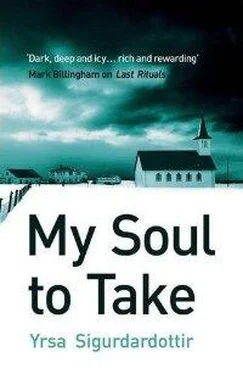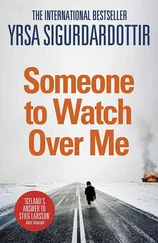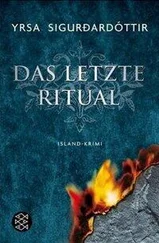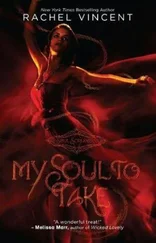“Do you know if she had anything to do with Eiríkur, the aura reader?” Thóra said.
Vigdís slowly shook her head. “No,” she replied. “I don’t think so. Actually, Eiríkur came to see me before he went to meet Jónas to ask for a pay raise. He wanted information about the local landowners. He needed the phone number of that brother and sister, Elín and what’s-hisname . . .”
“Börkur,” said Thóra. “Why did he want to contact them?”
“I don’t know. I thought it had something to do with the haunting. He’d been fascinated by all the commotion. I didn’t have their phone numbers, of course, but I did have a number for Berta, the girl who’s clearing out the old farmhouse, so I suggested he ring her to get their numbers.” She shut the file and put it back in its place. “Eiríkur tried to call her from the phone here in reception, but there was no answer, so I gave him the number of another local landowner, the only one I had apart from Berta’s.”
“Whose number was that?” asked Thóra.
“It was Rósa’s,” answered Vigdís. She took a sheet of paper from a pile on the desk and handed it to Thóra. “It’s an ad for the riding stables that Jökull asked me to hang up. It has her name and phone number.” She took the sheet back. “I took it down after that guy got hurt. I didn’t want any more guests getting crippled.” Vigdís seemed to suddenly notice that she had Thóra’s rapt attention. “I told the police about it because it was just before Eiríkur was killed in the stables.”
“So do you know if Eiríkur rang Rósa?” asked Thóra impatiently.
“No idea,” said Vigdís. “I wrote down both numbers and gave them to him.” She leaned over the desk and pointed. “He went and made a call from that phone over there. I think it’s the one and only time it’s been used, as it’s in such a silly place.” She straightened up. “I heard him talking for quite a while, so he must have got through.” She scribbled on a Post-it and handed it to Thóra. “Here are the numbers, if you want to ask Rósa and Berta about it.”
The phone was pushed back on top of a cabinet, under a gigantic stuffed elk’s head hung far too low on the wall. Thóra picked up the phone, taking care not to poke her eye out with a prong of its antlers. She pressed the “last number recall” button. The first number was neither of those on the Post-it, but the next was Rósa’s home number, followed by Berta’s mobile number. Thóra had to assume the first number was the most recently called, and irrelevant to Eiríkur. He had tried to call Berta and received no reply, and then he had contacted Rósa.
It was all coming together.
Thóra sank back in her chair. “You see, it all fits,” she said triumphantly. She closed the heavy binder containing the case documents and placed it on the wide armrest.
“Isn’t it time we found Thórólfur?” suggested Matthew. He glanced at his watch. “I’m beginning to think he must have left. It’s been an awfully long time.”
“The fog will probably delay him,” said Thóra, looking out of the glass doors. Visibility outside was very poor. She jumped as the basement door was suddenly flung open. “What now?” she said. “Are they still down there?” Something significant was clearly happening in the basement. The last of the animal bones must have been removed, as the men who emerged were empty-handed. They hurried past Thóra and Matthew without looking at them, then quickly returned loaded with equipment: cameras, vacuum cleaners, and spades.
“I think the child’s skeleton has been uncovered,” said Matthew. “They’re making more fuss than they did about the animal bones.”
“Ugh,” said Thóra with a shudder. “I just can’t understand how anyone could do that to a little child. They shut her up in a coal bunker just because of an inheritance and left her to die.”
“Grímur wasn’t all there, so there’s no way to comprehend what he did,” said Matthew, watching a man with a large arc light descend into the basement.
Thórólfur sat down heavily in the chair opposite them. He had approached astonishingly quietly, for such a large man. “Now, then,” he said, “I gather you want to talk to me.” He jerked his thumb at the basement. “I haven’t got much time—I really have to get down there. What’s up?”
Thóra passed him the binder containing the investigation documents. “I think I know who killed both Birna and Eiríkur,” she said. “We need more than a few minutes to explain it, but I don’t think you’ll find it a waste of time.”
Thórólfur harrumphed. “Don’t be too sure,” he said, leaning back in his chair. “Go ahead. No fancy talk, just the bullet points, please.”
When Thóra had finished telling Thórólfur about Rósa, the fox, the aloe-vera gel, Eiríkur’s phone call, and everything else she’d learned, she looked anxiously at him. “Rósa is definitely the killer, and her brother may be an accomplice at least. You can investigate fully, but I can’t.”
Thórólfur gazed thoughtfully at her. He had listened patiently and asked no questions. “I have spoken to her, in fact, about Eiríkur’s phone call,” he said. “She said he called to ask about hiring a horse, whether it was based at the farm or elsewhere.”
Thóra frowned. “What for?”
He shrugged. “I don’t know. I thought it was all a bit odd, but your story about the flowers and the gadget with the gel is most interesting.” He stood up and yawned. “I was hoping I could call it a day. I’d better look in on those two.” He glanced toward the basement door. “The discovery downstairs has been waiting for decades. It will hardly matter if it waits another half hour.”
Thóra could not conceal her pleasure. Thórólfur seemed to be taking her story seriously, whatever else happened. “Thank you, Thórólfur. Perhaps you’ll keep me informed?” She stood up.
Thórólfur beckoned to a police officer to accompany him out of the building. He looked at Thóra. “I didn’t say that.” He left without saying goodbye.
Thóra finished mashing potatoes and fish together for her daughter, who was carefully observing that the butter was evenly distributed throughout the mash. The chef certainly wouldn’t have imagined that his beautifully presented meal would end up like this. There were few diners in the dining room and the service was quick and efficient.
“I don’t know if I should eat this,” said Sigga, gazing at a pile of shellfish. “I thought I was ordering pasta.” Gylfi, who did have pasta, looked at her plate, clearly debating with himself whether he should offer to swap with the mother of his unborn child. In the end he said he would share his meal with her and the shellfish went to Matthew as an extra main course, along with the big steak he had already started on.
Thóra placed the plate of fishy mash in front of her daughter, who dug in. She reached hungrily for her own plate. She’d had enough of wondering who did what and why. She thanked her lucky stars she’d met the stockbroker before he left. He had contributed more to the search for the murderer than anything they’d done over the past few days.
She put down her knife and fork. “How did he get back to the horse rental when he fell off?” she said, puzzled.
“Who?” asked Matthew, putting down an empty shell.
“Teitur. He was injured and couldn’t drive, and he can hardly have walked,” she said. “Someone must have given him a lift.”
“Yes,” said Matthew. “So?”
Sigga and Gylfi listened, comprehending nothing. Sóley, on the other hand, was not interested; she was comparing the level of Coke in her glass and Gylfi’s.
“If someone gave him a lift, or helped him out, that person also knew about the horse’s reaction to the dead fox, and knew where the fox was.” She reached for her phone and took Teitur’s business card out of her pocket.
Читать дальше












